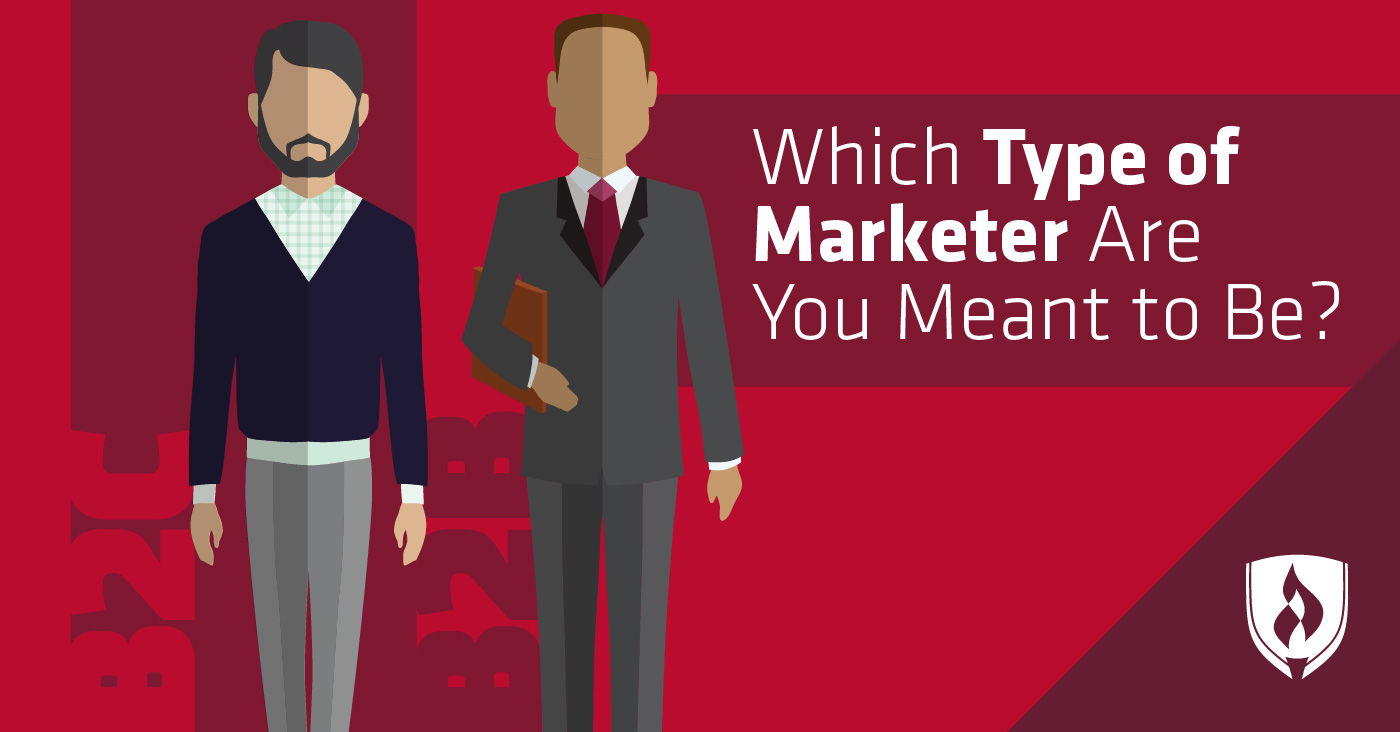
In marketing, there are so many variables. The who, what, when, where and even the why behind your campaign will impact how you proceed. Though “B2B” and “B2C” might sound a little like ‘90s boy-band names, these acronyms represent two major types of marketing—and both come with major differences in tactics and strategy. In this article we ask the experts and explain the differences between B2B and B2C marketing—particularly from the perspective of a marketing professional.
B2B vs. B2C: The basics
B2B stands for business to business. A B2B company sells products or services to other businesses. An example would be a company that sells industrial copy machines and printers to other companies.
B2C stands for business to consumer. A B2C company sells products or services directly to individual consumers. An example would be a company that sells clothes or personal items.
Seems pretty straightforward, right? But B2B and B2C companies handle their marketing very differently. So much so you may want to consider the differences between them before you sign on with your first employer.
B2B vs B2C: What is the difference in marketing?
The number of sales
“One big difference is scale,” says Sydney Liu, co-founder and CEO of Commaful. “In B2C marketing, typically, you are looking at driving thousands of signups or sales per campaign.” Liu says that each consumer pays a relatively small amount so the total number of people buying usually has to be higher in order for B2C businesses to be profitable.
In comparison, in B2B marketing, a few sales can make a quarter. “Because B2B companies typically have higher budgets, and B2B products tend to cost more, campaigns with several clients can be considered a huge success,” Liu says.
Logical vs. emotional appeal
Another big difference is in the approach taken to make a sale, according to Jameson Slattery, VP of global marketing at Colorescience. “B2B marketing is rooted in appealing to logic. Marketers in this position have to convince businesses that they will benefit from the product, often by showing that there will be a return on investment (ROI).”
In contrast, Elaine Kuckertz, SEO specialist at TopSpot Internet Marketing says ROI isn’t usually the primary selling point for consumers. “B2C marketing is rooted in appealing to emotion. Marketers in this position simply have to convince consumers that they want the product.”
How long it takes to sell something
The sales cycle is also very different for each setting—with B2B selling being a much more deliberate process.
“B2B companies involve a longer sales cycle, so content and calls to action need to be tailored to this,” says Kuckertz. “Rather than [a call to action of] ‘buy now’ which signifies something immediate, we might recommend a call to action such as ‘request a consultation,’ which speaks to the longer sales process in B2B.”
In B2C marketing, the goal is more often to prompt quick responses. Slattery says consumers will often make purchases within a few minutes or a few days. Most people don’t spend months debating their next clothing purchase—they see something they like and buy it. A B2C marketer’s job is to ensure their product is top of mind and easy to access when a customer is ready to make a purchase.
Social media strategy
“Another way that B2C and B2B marketing are different is social media strategy,” Kuckertz says. “B2B clients often ask me if they should invest in social media marketing. For the most part, the majority of their [web] traffic comes in through paid search and organic outlets, which is where we recommend spending their budgets. By contrast, I have seen B2C companies who have gained new business through Facebook.”
For example, even if you work for a business in dire need of new sales software or a new printing solution, odds are good that you’re not immediately clicking a Facebook advertisement for these things in your free time. This disconnect between user intent (casually browsing social media) and the advertiser’s goal can limit the effectiveness of B2B social media marketing.
You should consider working in B2B marketing if…
As you can see, these two marketing approaches have many differences. Marketers with the following traits might prefer to market to other businesses.
You love data
“All marketing relies on data in one way or another, but to excel in a B2B marketing position, a person must be able to make sense of various types of data on a regular basis,” Slattery says.
Businesses make buying choices based on saving and making money, Slattery explains, so they expect to see a factual and logical presentation of the data. If you enjoy making sense of data, and using researched facts to support your ideas, you may excel in a B2B role.
You like to learn
“You will excel in B2B marketing if you love to learn,” Kuckertz says. “B2B companies are less intuitive than a company that sells to consumers, so you get the chance to learn about industries.”
B2B marketers learn the intricacies of industries they may have never given a second thought to before. Kuckertz says her work has led to her getting well-versed in the details of industries like metal machining, magnetic sensor distribution and rubber manufacturing—to name a few—in order to be a more effective marketer.
“I enjoy meeting with my clients and understanding what is most important for their business to be successful,” Kuckertz says.
You prefer to really dig into one project
The sales cycle tends to be longer in B2B, which means you get to really research your target audience and try to consider all of their concerns. “Something that I really enjoy is that I can really get into tools and information that isn't broadcast to the standard consumer,” says RaShea Drake, B2B marketing specialist with Verizon.
“I feel like I can get really deep into an industry and get to know it. With B2B, I have to go beyond standard marketing lingo and into what value my service provides.”
You’re a long-term planner
“I would say that B2B is for the slow planner who likes to be organized,” Drake says. The longer, more comprehensive nature of these sales often requires planning out your moves in advance. “Even though I'm not a super organized person myself, my efforts are definitely more thought out and planned in advance with B2B than they were in B2C.”
There’s a much smaller pool of customers in a B2B setting, which means thoughtful planning and organized messaging becomes even more important.
You should consider working in B2C marketing if...
Maybe marketing to consumers is more your speed. These traits would serve you well in a B2C environment.
You love expressing your creativity
“Since many consumers are drawn to flashy and appealing advertisements, B2C marketing naturally provides opportunity for creative freedom,” Slattery says. “Creative people are more likely to take artistic chances, and a lot of B2C marketing relies on creative chances.” While Slattery explains that every marketer needs creativity, marketers in B2C environments will likely get some more room to show off their creative chops and try different approaches.
You think fast on your feet
The quicker sales cycle of B2C marketing quickens the pace of your job. You want to be aware of what consumers are seeing and acting on in real time. “The B2C person is really up on the latest trends and knows how to capitalize on them quickly,” Drake says. “They're fast thinking and fast moving.”
You like to experiment
“The wide variety of consumers allows for room to change up marketing tactics regularly and experiment,” Slattery says. In B2C, there is more room to try several different ideas and test them against each other for effectiveness.
“I'm constantly testing random and new ideas as well as trying new things to get people excited,” Liu says. “I have to be on top of the top trends in pop culture as they are happening. It’s extremely fun and really pushes me to think creatively.”
You understand social media
“Because B2C marketing focuses more heavily on social media, having an understanding of the big social platforms will help you,” Kuckertz says. Generating buzz on Twitter or launching a Facebook ad are common moves in the B2C marketing world that you don’t see as much of in B2B. If you not only use, but also enjoy the capacities of social media, you’ll be more prepared for that aspect of the job.
Still on the fence?
If you are still on the fence with all the differences between B2B and B2C marketing, then don’t worry! You don’t have to decide between them yet.
Raj Shah, senior marketing manager of SEO at Takelessons, says the two markets are increasingly merging together because of big data and digital marketing. “I no longer think B2B or B2C—I have to think both,” Shah says. “In today’s business world, where companies have both providers and users that benefit from the product, we can't afford to think B2B versus B2C.”
Even if you will wind up working for a company that deals pretty strictly with either businesses or consumers, Liu recommends trying to get some experience on both sides. “There are positives about both B2B and B2C, and most marketers find one more interesting than the other after they try them.”
Marketing careers are full of choices. Get the inside scoop on the industry in our article, “11 Things I Wish Someone Told Me About Pursuing a Career in Marketing.”
Related Articles:




